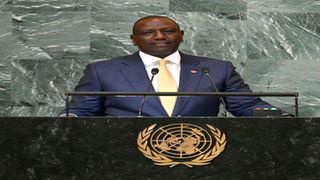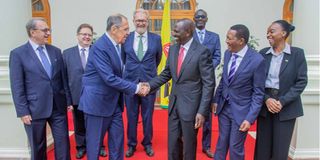
President William Samoei Ruto addresses the 77th session of the United Nations General Assembly at the UN headquarters in New York City on September 21, 2022.
| AFPKenya@60
Premium
The hits and misses of Kenya's diplomatic journey, 60 years on
Kenya last Thursday marked Madaraka Day, which commemorates the country's self-rule from Britain in 1963. It was then that the first steps were taken in Kenya's arduous quest for diplomatic rights.
Sixty years on, how can we assess the journey? There have been changes. And the latest departure from conventional diplomacy, after 60 years of concerted effort, has raised eyebrows.
On March 1, 2023, the Ministry of Foreign and Diaspora Affairs issued a note verbale (an official diplomatic letter or communication) to all diplomatic and consular missions, UN agencies and international organisations, advising them to "communicate directly with Ministries, Departments and Agencies (MDAs) of the Government of Kenya without going through the Ministry of Foreign and Diaspora Affairs".
This is a misnomer. The Vienna Convention (1961) requires that all official business with the receiving state be conducted through the Ministry of Foreign Affairs. Kenya's shift has created several national security risks and embarrassments. And we must ask two pertinent questions.
First, where does Kenya stand today on the geopolitical stage? Second, has Kenya achieved 'pivot state' status, as envisaged at independence, to withstand the era of the 'New Cold War'?
A pivot state, according to The Hague Centre for Strategic Studies, is a country that "possesses
military, economic or ideational strategic assets that are coveted by great powers". The question of a pivot state has arisen because of Kenya's position on the Ukraine crisis.
Since the beginning of the Ukraine crisis in February 2022, following Russia's invasion of the country, the United Nations General Assembly has held five significant votes on the issue as of March 2023. All against Russia. Kenya voted 'yes' on most of them and abstained on others. However, Kenya's immediate neighbours, namely Tanzania, Uganda, South Sudan and Ethiopia, have often abstained or been absent during the vote.
As a country, we need to realise a simple hypothesis. The die has been cast on Ukraine and the votes don't matter, (in fact, there was legal weight behind these resolutions).
The Ukrainian saga is synonymous with the situation in Korea in 1945 when the country was divided along the 38th parallel by the occupying forces of the USA and the Soviet Union. The ongoing fighting inside Ukraine is to determine where that line will be drawn (in Ukraine).
For the record, Kenya is not yet a pivot state, and it would be a tragedy if Kenya were to get caught up in geopolitical tensions and hegemonic power struggles.

Russian Foreign Minister Sergey Lavrov meets President William Ruto and other Kenyan leaders at State House Nairobi on May 29, 2023.
In terms of Kenya's position on the geopolitical stage, Kenya is ambivalent about whether to act east or look west. This was not a challenge when Kenya gained full independence from Britain on December 12, 1963.
Diversified portfolio
President Jomo Kenyatta recognised the fluid nature of international relations and diversified his portfolio of alliances. He resisted external influences that might threaten Kenya's sovereignty. He found solace in value-based diplomacy, soft power and multilateralism.
As a Pan-Africanist, he forged strong links with other newly independent African nations. The intention was to exorcise the evil spirits of the 1884 Berlin Conference and achieve a Pax Africana. This is now on course, and if the momentum is maintained, the world may witness a historic first for the African continent: the formation of a home-grown, post-Cold War, post-Pax Americana security framework.
The foundation laid by Kenyatta, sustained by President Moi, and strengthened by President Kibaki, has produced three great achievements.

Former President Moi with former President Ronald Reagan during the Kenyan leader's visit to the United States.
Today, Kenya is home to the United Nations Office at Nairobi (UNON) — one of the four UN headquarters in the world, and the only one outside the US and EU.
This was achieved through a masterstroke of diplomacy, after 23 years of consultations. But we must not rest on our laurels. There have been attempts to move UNON to Asia.
Secondly, Kenya has developed strong economic ties with the East. Today, China is Kenya's leading trading partner, followed by India. Both countries abstained in the UNGA vote on Ukraine.
These are countries with useful development experience that Kenya can benefit from. Unlike the West, their wealth was not amassed by exploiting slaves or plundering colonies.
Third, Kenya has remained an active member of the 144-member Non-Aligned Movement (NAM), a strength that has helped Kenya gain global credibility.
Neutrality and non-alignment have enhanced Kenya's prestige and confidence within the UN community, leading to its election to the UN Security Council on five occasions.
Finally, Kenya will emerge as a pivot state through pragmatic diplomacy, the strengthening of
conventional diplomacy and expanding the network of mutually beneficial allies, as it has sought to do for the past 60 years.
Mr Ngovi Kitau was Kenya’s first ambassador to the Republic of Korea (2009-2014); [email protected]





